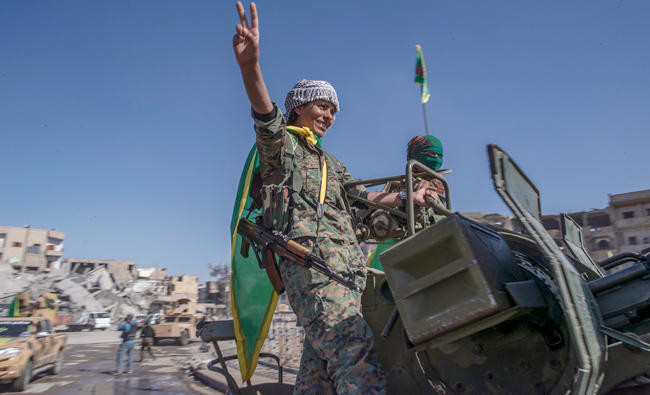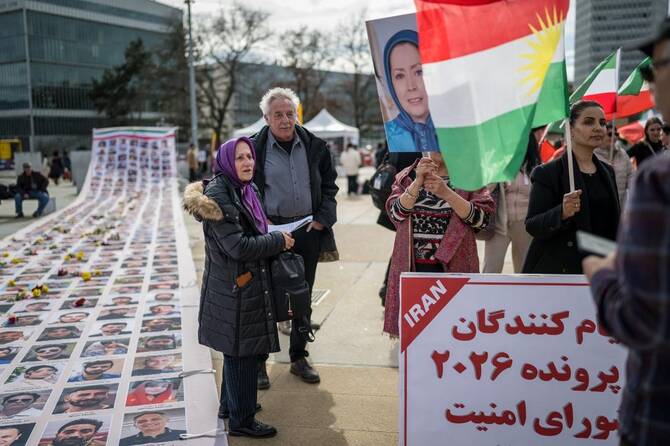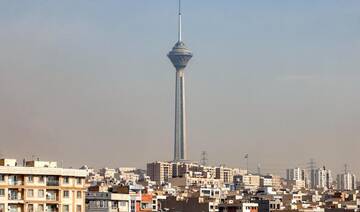BEIRUT: Fighters with the Syrian Kurdish YPG militia have credited Kurdish leader Abdullah Ocalan with their victory over Daesh in Raqqa, in apparent response to US criticism of their praise of a man jailed in Turkey for treason.
In a video praising Ocalan’s “ideological power,” the YPG (People's Protection Units) fighters rebuffed US criticism of battle celebrations in Raqqa last week where the YPG’s all-female affiliate, the YPJ (Women's Protection Units), unfurled a banner with his face on it.
The banner has become a new focal point for Turkey’s anger over US support for the YPG, which Ankara sees as an extension of Ocalan’s outlawed Kurdistan Workers’ Party (PKK).
Deeply concerned by the rise of Kurdish power in northern Syria, Turkey has opposed the US alliance with the YPG which spearheaded the Raqqa campaign under the banner of the multi-ethnic Syrian Democratic Forces (SDF).
On Saturday, the US Embassy in Turkey issued a statement reiterating its misgivings about Ocalan, in an apparent response to criticism from the Turkish government over the banner.
“The PKK is listed among foreign terror organizations. Ocalan has been jailed in Turkey for his actions related to the PKK. He is not a person to be respected,” it said.
In the video circulated by the YPG press office on Sunday, seven fighters credit Ocalan’s ideology for the defeat of Daesh at Raqqa, which served as the terrorists’ Syrian base of operations and a hub for planning attacks in the West.
“All victories, developments and gains made here are results of a great battle based on his opinions and philosophy. If his ideological power hadn’t been with us, we wouldn’t know what to do in such a situation,” said one of the fighters.
“Raqqa would never have been rescued from the darkness of recent years, and all other IS (Daesh) occupied cities as well.”
Ocalan’s influence runs deep in Kurdish-led regions that have emerged in northern Syria since its civil war began in 2011. Steps are under way to establish a new political system based on his ideas about federalism and local democracy.
Another of the fighters, who identified himself as a Canadian and gave his name as Hozan Kobani, said the US government position on Ocalan was “a mistake” and “a bit behind the times.”
“The writings and the philosophy and the influence of Abdullah Ocalan was very, very decisive in motivating the soldiers with an ideology of peace and democracy that allowed this liberation to be possible,” he said.
The US-led coalition has said the Ocalan banner was not sanctioned by the SDF leadership. “Furthermore, the Coalition does not approve of the display of divisive symbols and imagery at a time in which we remain focused on the defeat of Daesh in Syria,” Col. Ryan Dillon, the coalition spokesman, said.
Ocalan has been in jail in Turkey since 1999 on a treason conviction. More than 40,000 people, most of them Kurds, have died in the fighting since the PKK took up arms against the state in 1984.
The PKK is considered a terrorist organization by the United States, Turkey and the EU.
YPG fighters credit Ocalan with victory
YPG fighters credit Ocalan with victory

Iran says students have right to protest but must know ‘red lines’

- University students in Iran started a new semester Saturday with pro- and anti-government rallies, according to local media
Tehran: University students have the right to protest but everyone must “understand the red lines,” the Iranian government’s spokeswoman said Tuesday, in the first official reaction to renewed rallies on campuses since the weekend.
“Sacred things and the flag are two examples of these red lines that we must protect and not cross or deviate from, even at the height of anger,” Fatemeh MoHajjerani said.
She said Iran’s students “have wounds in their hearts and have seen scenes that may upset and anger them; this anger is understandable.”
University students in Iran started a new semester Saturday with pro- and anti-government rallies, according to local media, reviving slogans from nationwide demonstrations that peaked in January and led to thousands of deaths.
Protests first began in December sparked by economic woes in the sanctions-hit country, but grew into nationwide demonstrations on January 8 and 9.
The US-based Human Rights Activists News Agency (HRANA) has recorded more than 7,000 deaths, while warning the full toll is likely far higher.
Iranian officials acknowledge more than 3,000 deaths, but say the violence was caused by “terrorist acts” fueled by the United States and Israel.
MoHajjerani on Tuesday said a fact-finding mission is investigating “the causes and factors” of the protests and will provide reports.











